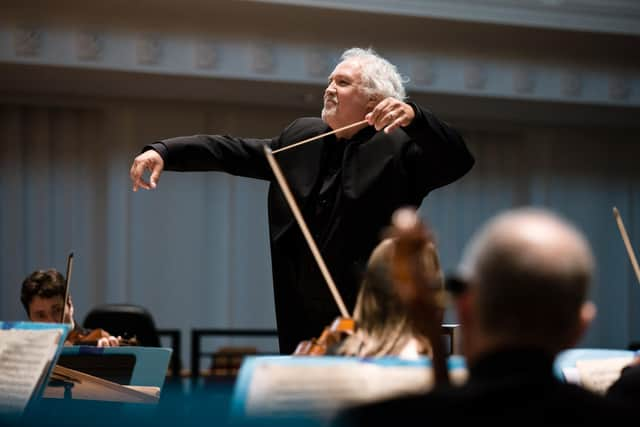'The adrenaline kicks in' - Donald Runnicles on conducting Mahler’s epic Ninth Symphony with the BBC SSO
For some, it’s a monumental farewell to life, a desperate attempt to cling to the last vestiges of existence. For others, it’s an equally grand celebration of life – in all its chaotic variety, its tragedies and its joys.
There’s no doubting, however, that Mahler’s Ninth Symphony is an epic statement of – well, something. Death was hovering close when the composer completed the piece in 1909: he’d just been diagnosed with a terminal heart condition, and he’d lost his beloved daughter Putzi at the age of only four. He’d die just two years later. There’s no doubting that his Ninth – his final completed symphony – is an overwhelming, powerful, cathartic experience for the listener. It’s an experience that the BBC Scottish Symphony Orchestra is about to offer audiences in Aberdeen, Edinburgh and Glasgow, joined by Conductor Emeritus Sir Donald Runnicles.
Advertisement
Hide AdAdvertisement
Hide Ad“Three concerts over four days – I’m quite sure that will be emotionally draining for the orchestra and for me, but you know, the adrenaline kicks in,” he explains. “And we may go to completely different places in each of them – that’s the beauty and mystery of having the chance to repeat a performance.”


As well as adrenaline, Runnicles points to the sheer strength needed to direct the 90-minute Symphony. “What it needs most of all is mental stamina, in terms of its emotional and spiritual journeys. I’m a bit of a marathon runner in that sense: conducting Mahler’s Ninth is like doing the first act of Wagner’s Tristan und Isolde, and I’d have two more acts after that.”
He’s a conductor more than used to leading large-scale creations, as Music Director at the Deutsche Oper Berlin and former Music Director of San Francisco Opera, as well as Music Director of Wyoming’s Grand Teton Festival and Principal Guest Conductor of the Atlanta Symphony Orchestra. To Scottish audiences, however, Runnicles is best known as the BBC SSO’s much-loved Chief Conductor for many years. “We’ve built an important relationship that I savour every time I return,” he explains. “It’s a fantastic orchestra, and one of my great highlights working with them has been our journey together through the music of Mahler.”
Runnicles’s passion for the composer goes back to his student days at the University of Edinburgh. “I wrote a thesis on Mahler, specifically comparing versions of the Fifth Symphony, the revisions he made on the basis of being a conductor as well as a composer.” Indeed, with his conducting roles in opera houses and concert halls worldwide, it’s not too much of a stretch to compare Runnicles’s musical activities with those of his great forebear a century ago. “His symphonies are profoundly theatrical,” Runnicles continues. “They’re a particular kind of three-dimensional experience, for audience members and musicians – he’s always drawing you into sound worlds, landscapes where there’s a foreground and a background.”
If you accept that theatricality about Mahler’s music, isn’t it tempting to try to decode it – in this case, in the mighty Ninth Symphony – for a meaning? “I think there’s a temptation,” Runnicles agrees, “and I think it’s well worth the speculation. Mahler the man is mirrored in so many of his works – his personality and his experiences are reflected in a very individual way throughout his symphonies. In the Ninth Symphony, of course, there are so many more questions than answers. Is it a farewell to life? Or is it a celebration of life?”
For Runnicles, however, it’s Mahler’s dark Tenth Symphony that sheds the greatest light on his Ninth. That later work – left unfinished at Mahler’s death (which itself speaks volumes) – was only completed by Mahler expert Deryck Cooke in the 1960s and 70s. “It’s as if you’ve read a book with nine chapters, and then somebody reveals a tenth chapter that ties everything together. Mahler’s Ninth is not a leave-taking: he’s fully aware that he’s mortal, that he has heart disease, and of all the trials and tribulations of his life, but he wants to live, to compose and to love. That’s what’s in the back of one’s mind as a conductor: you’re seeking the joy more than you’re seeking the pain.”
Sir Donald Runnicles conducts the BBC SSO in Mahler’s Ninth Symphony at the City Halls, Glasgow, 9 February, Music Hall, Aberdeen, 10 February and Usher Hall, Edinburgh, 12 February, see www.bbc.co.uk/events/rwrzp6